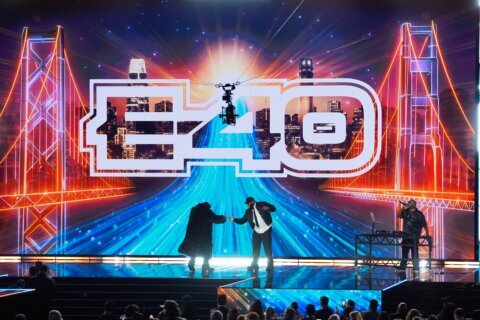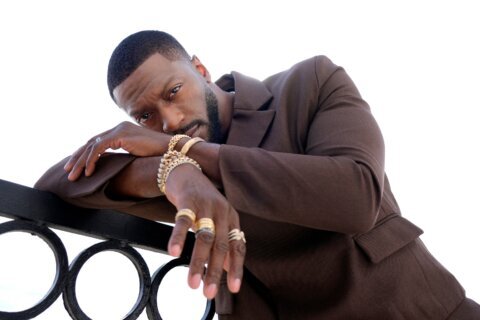WASHINGTON — Call it the original summer blockbuster, the launch of Steven Spielberg’s career, the scariest flick ever made, a “Moby Dick” action adventure, a social commentary on beach towns and greedy mayors, or a deeply human story of family, science and wonder.
In truth, “Jaws” (1975) is all those things, and this Saturday, Wolf Trap presents it on a giant screen set to John Williams’ iconic score performed live by the National Symphony Orchestra.
“It just makes the movie come alive in a way that you can’t experience, even in the best movie theater, certainly not on your iPhone,” conductor Emil de Cou told WTOP. “You get to hear a 100-piece orchestra in a surround sound kind of space. It’s like hearing the music in 3D.”
These live movie concerts have become something of an annual tradition at Wolf Trap, including two sold-out events last summer for “Jurassic Park” (1993) and “La La Land” (2016).
“These films have become their own industry in the past 10-15 years with live orchestra,” de Cou said. “If you’ve never been to Wolf Trap, it’s the most beautiful outdoor venue in America. It’s a huge national park for the performing arts. … We have a huge screen above the orchestra … then we have two screens out on the lawn, which accommodates about 4,000 people if you want to come picnic. … This is the only way to experience a film these days.”
And of all movies to choose from, “Jaws” is the perfect pick for a warm summer night.
“This was [Williams’] first great score, Spielberg’s first great movie … It put these two geniuses on the map who have changed American cultural history,” de Cou said. “It was the beginning of the summer blockbuster. … This was the model; they invented it and it’s still the best. It scared generations out of the water in the way that ‘Psycho’ scared generations from taking a shower. You can’t go into the water on a hot summer day without hearing those two notes.”
Not only was the music a pop culture phenomenon, it was musically groundbreaking.
“Williams invented the first minimalist score,” he said. “When he played that famous ‘Jaws’ theme, Spielberg started laughing. He thought it was a joke. He was like, ‘No, it’s serious. This is it.’ If you’re sitting at the piano, the two closest notes together: ‘da da.’ It becomes closed in on itself and claustrophobic, not just the anticipation but the heartbeat of the audience. … It is one of the most creative, inventive scores any composer has ever come up with.”
In fact, the score saved the movie when the robotic shark didn’t work. Instead, Spielberg opted for underwater P.O.V. shots set to Williams’ score, which stands in for the beast.
“The film went over budget,” de Cou said. “Spielberg was not a famous director at the time, Williams was not a famous composer, so there was a big risk. They had the shark, the key of the movie, that wasn’t working! So they substituted just a fin or a ripple of a wave. The music filled in for the fact that you couldn’t have this mechanical shark and made it much scarier.”
In addition to the terrifying two-note theme, there’s also some beautiful adventure music.
“To break up the intensity, you get these lighter moments, like swashbuckling pirate music,” de Cou said. “When they first launch to sea, it’s a beautiful day, the ship isn’t messed up. You get this fun, upbeat, hornpipe music that you’d play on a ship in 1700. He mixes this upbeat, joyful, seafaring music, then that incredibly claustrophobic, underwater shark theme.”
Equally important is the absence of music at crucial moments.
“Having just silence is very rare now,” de Cou said. “But if you listen to ‘Jurassic Park’ — the famous t-rex scene — there’s seven minutes of no underscoring. ‘Jaws,’ likewise, there’s five, six, seven minutes with no music. … There’s nothing more suspenseful or awkward in a film as when you have no music at all, so using that canvas of silence, then you bring in the shark theme after five minutes, it heightens the moment and heightens the terror of it all.”
It’s particularly “terrifying” for de Cou as he tries to keep the orchestra precisely on beat.
“You have to line up the score within a millisecond of where the music should be,” de Cou said. “What they did was take the soundtrack off the film and we’re supplying that live. I’m looking at a bunch of information, digital readouts, numbers, colors flashing on my screen. … It takes me four times the amount of time to learn ‘Jaws’ as it would a Beethoven symphony.”
The concert starts at 8:30 p.m., but if you show up an hour early, you can see a special Q&A.
“There’s a preshow talk with shark experts from the Smithsonian,” de Cou said. “It’s a good chance to hear scientists talk about sharks and facts and fiction.”
Summer after summer, why do folks keep coming to Wolf Trap for these movie concerts?
“It resonates with people,” de Cou said. “Movies over time become more than just movies; they become part of our lives, our collective storytelling, modern-day folk tales. Something like ‘Raiders’ or ‘Jaws’ or ‘Jurassic Park,’ you remember it when you were a kid or a teenager and it stays with you. So, you come back and see the same movie, but you see it differently because you’ve grown up. But you still hold these stories as part of your childhood.”
Find more details on the venue website. Hear our full chat with conductor Emil de Cou below:








